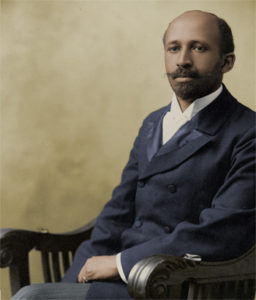
W.E.B. Du Bois
*This date marks the birth of W.E.B. Du Bois in 1868. He was a Black sociologist and activist.
William Edward) Burghardt Du Bois was born in Great Barrington, Mass. He graduated from Fisk University in Nashville, Tenn., in 1888. He received a Ph.D. from Harvard University in 1895. His doctoral dissertation, The Suppression of the African Slave Trade to the United States of America, 1638-1870, was published in 1896. Although Du Bois took an advanced degree in history, he was broadly trained in the social sciences. When sociologists were theorizing about race relations, he was conducting inquiries into the condition of Blacks.
For over a decade, he devoted himself to sociological investigations of Blacks in America, producing 16 research monographs published between 1897 and 1914 at Atlanta University, where he was a professor. Du Bois also wrote The Philadelphia Negro; A Social Study 1899, the first case study of a Black community in the United States. At first, Du Bois believed that social science could provide the knowledge to solve the race problem. Still, he gradually came to the conclusion that in a climate of virulent racism, expressed in such evils as lynching, peonage, disfranchisement, Jim Crow laws, and race riots, social change could be accomplished only through agitation and protest. In this view, he clashed with the most influential Black leader of the period, Booker T. Washington, who, advocating a philosophy of accommodation, urged Blacks to accept discrimination for the time being and elevate themselves through hard work and economic gain.
In 1903, in his famous book The Souls of Black Folk, Du Bois charged that Washington's strategy, rather than freeing the Black man from oppression, would only perpetuate it. This attack crystallized the opposition to Booker T. Washington among many Black intellectuals, polarizing the leaders of the black community into two wings--the "conservative" supporters of Washington and Du Bois’ "radical" critics. Two years later, in 1905, Du Bois took the lead in founding the Niagara Movement, which was dedicated chiefly to attacking the platform of Booker T. Washington. Internal disputes and Washington’s opposition seriously weakened the small organization, which met annually until 1909. However, it was significant as an ideological forerunner for the interracial NAACP founded in 1909. Du Bois played a prominent part in creating the NAACP and became the association's research director and editor of its magazine, The Crisis.
Here, he wielded an unequaled influence among middle-class blacks and progressive whites as the propagandist for the black protest from 1910 until 1934. In the Niagara Movement and the NAACP, Du Bois acted mainly as an integrationist, but his thinking always exhibited, to varying degrees, separatist-nationalist tendencies. Du Bois' black nationalism took several forms, the most influential being his pioneering advocacy of Pan-Africanism, which was the belief that all people of African descent had common interests and should work together in the struggle for their freedom. Du Bois led the first Pan-African Conference in London in 1900 and was the architect of four Pan-African Congresses held between 1919 and 1927. Second, he articulated cultural nationalism. As the editor of The Crisis, he encouraged the development of black literature and art and urged his readers to see "Beauty in Black." Third, Du Bois’ black nationalism is seen in his belief that blacks should develop a separate "group economy" of producers' and consumers' cooperatives as a weapon for fighting economic discrimination and Black poverty.
This doctrine became especially important during the economic catastrophe of the 1930s and precipitated an ideological struggle within the NAACP. He resigned from the editorship of both publications in 1934, yielding his influence as a race leader and charging that the organization was dedicated to the interests of the Black bourgeoisie and ignored the problems of the masses. Du Bois’ interest in cooperatives was a part of his nationalism that developed from his Marxist leanings. At the turn of the century, he advocated black capitalism and black support for black businesses, but by about 1905, he had been drawn toward Socialist doctrines. Although he joined the Socialist Party briefly in 1912, he remained sympathetic to Marxist ideas throughout the rest of his life.
Upon leaving the NAACP, he returned to Atlanta University and devoted the next ten years to teaching and scholarship. 1940, he founded the magazine Phylon, Atlanta University's "Review of Race and Culture." In 1945, he published the "Preparatory Volume" of a projected encyclopedia of the Black, for which he had been appointed editor-in-chief. He also produced two major books during this period. Black Reconstruction and Dusk of Dawn. Following this decade at Atlanta University, he returned to a research position at the NAACP until 1948. Thereafter, Du Bois moved steadily leftward politically.
He identified with pro-Russian causes and was indicted in 1951 as an unregistered agent for a foreign power. Although a federal judge directed his acquittal, Du Bois had become completely disillusioned with the United States. In 1961, he joined the Communist Party and, moving to Ghana, renounced his American citizenship more than a year later. DuBois, one of the most essential Black protest leaders in the United States during the first half of the 20th century, died on Aug. 27th, 1963, in Accra, Ghana. His autobiography was published in 1968.
The African American Atlas
Black History & Culture an Illustrated Reference
by Molefi K. Asanta and Mark T. Mattson
Macmillan USA, Simon & Schuster, New York
ISBN 0-02-864984-2